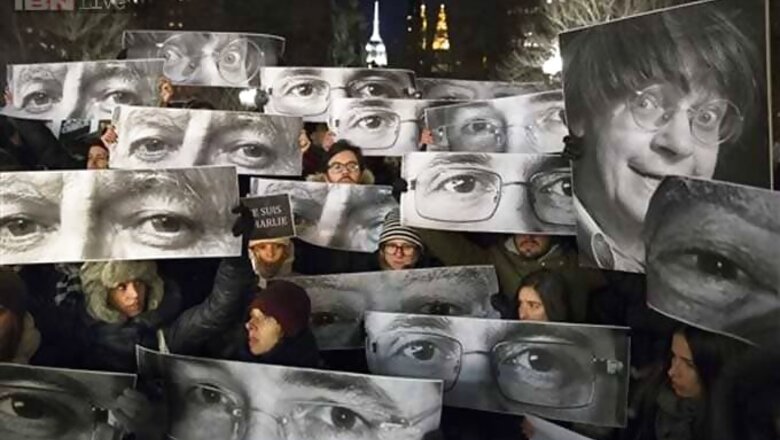
views
Paris: Paris made the Charlie Hebdo journal an honorary citizen and the creator of Asterix offered to draw for it on Friday as support poured in for the satirical weekly decimated by Islamist gunmen for mocking Prophet Mohammad.
French Culture Minister Fleur Pellerin said the government was ready to grant the struggling newspaper one million euros ($1.18 million) "so it can continue next week and the week after that and the week after that".
Twelve people were killed in the attack on Charlie Hebdo's office on Wednesday, including its editor-in-chief and leading cartoonists, sending shockwaves around France and beyond. The suspected assailants were surrounded by police in a town north of Paris on Friday in a print works where they were believed to be holding a hostage.
Albert Uderzo, the 87-year-old who created the famed French comic character Asterix, announced he would come out of retirement to help illustrate the irreverent weekly, which plans to print a million copies of its next edition next Wednesday.
The wave of support spelled an unexpected turnaround for Charlie Hebdo, whose line in sexually explicit cartoons and anarchic commentaries was attracting ever fewer buyers. Its circulation slipped to 30,000 last year, below break-even level.
But the loud denunciation of the attack across the political spectrum and at many spontaneous rallies showed the small ad-free weekly stood for a widely shared attachment to free speech and a lingering nostalgia for France's May 1968 student revolt.
Paris Mayor Anne Hidalgo told a city council session that honorary citizenship of the capital was seldom given and had in the past "distinguished great resistance fighters against dictatorship and barbarism.
"By choosing to grant it to Charlie Hebdo, Paris - our city - shows a heroic newspaper the respect due to heroes," she said. The city's official homepage carried a black sign declaring "Paris est Charlie" ("Paris is Charlie").
Two of the victims, proofreader Mustapha Ourrad and policeman Ahmed Merabet, were Muslims.
Mainstream media rallied around the "enfant terrible" of the French press, with newspaper Liberation providing office space and Radio France, France Televisions and the daily Le Monde pledging staff and equipment to help produce the next edition.
Publishers contributed 250,000 euros and a new media fund partly backed by Google said it would do the same. In London, editor-in-chief Alan Rusbridger tweeted that his Guardian Media Group would pitch in 100,000 pounds ($151,410).
French media reported that subscriptions for Charlie Hebdo have soared, with over 8,000 coming in on Thursday alone. Hidalgo said Paris would buy subscriptions for all its 163 city councillors and the public bank BpiFrance took out 50.
Uderzo, who created the plucky Gaul Asterix fighting the occupying army of ancient Rome, said his popular comics and the highly politicised Charlie Hebdo had nothing in common.
"I just wanted to show my friendship for the cartoonists who paid with their lives," he told Europe 1 radio. In a video, he showed a cartoon with Asterix slugging a man wearing traditional Arab slippers and shouting "Me too, I'm a Charlie!"
Even some of Charlie Hebdo's favourite targets - Muslim, Christian and Jewish clerics and far-right leader Marine Le Pen - have expressed their support for it. Asked why, they say they are defending free speech and France's official secularism.
Both are key pillars of the widely proclaimed "republican values" that grew out of the 1789 French Revolution and can unite citizens beyond political, ethnic and religious divides.
For a smaller group of urban intellectuals and the die-hard disgruntled, Charlie Hebdo is also a weekly reminder of the heady May 1968 uprising that brought France to a standstill and coined slogans like "It is forbidden to forbid".
Daniel Cohn-Bendit, the French-German Green politician who was one of the revolt's leaders, lauded Jean Cabut, a leading "Charlie" cartoonist killed in Wednesday's attack, as "anti-clerical, anti-nationalist, anti-militarist, anti-everything".
"When you say 'we are all Charlie', you're saying we're in the same line as those who claim part of May '68 as their own."


















Comments
0 comment